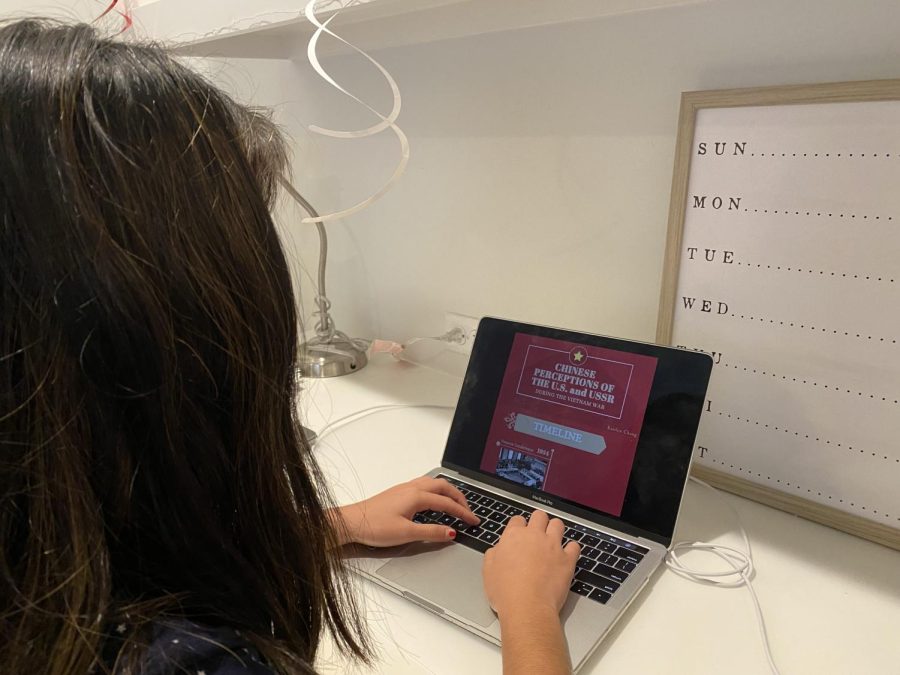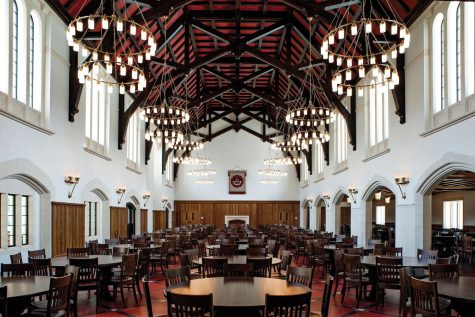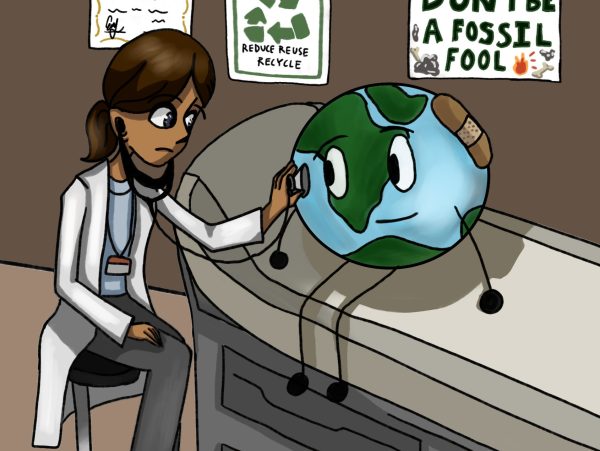Why projects are more effective assessments than midterm exams
Sophomore Kaitlyn Chang works on a project for her history class.
Picture a scene during the first week of December. As a diligent student, you’re anticipating midterm exams in two weeks, and you begin to organize a study plan for each course.
Math? Logarithms, conic sections and probability are fair game. Latin? Prepare to translate and dissect grammar within any of the thousand-odd lines you’ve studied from the works of Caesar, Cicero and Catullus. Chemistry? The menu includes compounds you can barely pronounce. You groan. Time to begin compiling the 20-page study guides.
But in history and English, you won’t need to review events over several thousand years or analyze literature on the spot. You walk into class beaming because you’ve already turned in your annotated bibliography and midyear paper—a fair representation, you think, of your capabilities. You internally express thanks to whoever suggested projects as a replacement for exams.
Let’s back up for a second. Yes, the divergence between the stress levels in these scenarios might seem non-intuitive because successful projects do require substantial time investments. If implemented as planned, however, projects and exams should have different assessment periods and thus different times of anxiety. Exams concentrate stress into the few days before the event itself, culminating in a three-hour sitting. In contrast, projects distribute the mental labor across weeks or months. Last year, the 11th-grade history fall research project was due in December, and classes selected research topics in September—a 10-week interval. That’s plenty of time to compile an annotated bibliography.
The self-driven nature of a long-term assignment mimics real-world problem-solving.
— Russell Li
Of course, some may procrastinate until the night before, but those students themselves are accountable for any stress incurred by shoddy time management. Teachers are there to help with individual planning and even set intermediate deadlines. In that sense, projects teach students how to manage workloads by planning ahead and breaking large tasks into smaller chunks, a skill applicable to adulthood. Apart from decreasing stress during the semester, projects therefore contribute to a primary goal of education—molding self-sufficient citizens, an outcome that improves long-term wellbeing.
The pedagogical advantage of projects manifests from the first day that assignments are given. Students start from a blank slate and must develop their own angles, a process that leads them to consider multiple possibilities and fulfills the objective of exposing everyone to diverse topics. The self-driven nature of a long-term assignment mimics real-world problem-solving because a solutions manual is not available in either scenario; often, students produce outputs that cannot even be found in the vast branches of academia. Idea generation is a significant method of catalyzing the societal change that so many Gen Z-ers desire. Facebook—and social media as we know it—would be far different if not for the open-ended thinking and initiative of one tech nerd. And the ability to brainstorm organic solutions and see them to completion offers value in situations ranging from traffic jams to an emergency aircraft landing on the Hudson River (please refer to U.S. Airways Flight 1549).
Throughout projects, students grapple with roadblocks and directional changes, two inevitable aspects of existing in the world. As we fall in love with our topics, many of us set lofty goals that must undergo revision. Implementing our ideas helps strengthen our grasp of our own capabilities and points us to areas of improvement. We may learn to acquire a foundational understanding before aiming for our wildest aspirations because an unresolved topic may threaten the validity of an entire thesis. Unlike exams, one cannot merely accept defeat in a project by skipping a question, so every issue that arises necessitates a solution. The act of confirming our conclusions at each step of a project requires us to continuously problem-solve, which helps prepare us for the surprises that we will face outside the SJS bubble.
Only through embracing the flow of ideas can we grow, an opportunity that projects present.
— Russell Li
One could argue that exams similarly require planning, creativity and a real-time response to snags. To those readers, I raise you one. Projects strengthen collaboration. Exams cannot. (Unless the exams in question are of the group variety, in which case I love you forever for proposing that.) Few people can wade through a project without questions. The rest of us must, if permitted, consult our teachers and classmates for advice ranging from locating articles on JSTOR to fixing bugs in Mathematica code, even if only to confirm our existing inclinations. Only through embracing the flow of ideas can we grow, an opportunity that projects present. And when circumstances require us to work in groups, coordination and communication become paramount. Occasionally, students may need to step out of their comfort zones, but we should accept the reality that others may have brash personalities or sleeker solutions—we live in a society of seven billion.
Exams also draw criticism because students often feel pushed by their cumulative nature to memorize a semester’s worth of information during a week or two of preparation, hoping that they will regurgitate their notes during the test. A confining factor rather than a motivating one, memorization prevents students from taking tangents that satisfy their intellectual curiosity, primarily owing to the necessity of covering a gargantuan predefined topic list. Projects accomplish the opposite because of their open-ended nature and have the added benefit of reducing stress because students sometimes choose their topics, and I assume that people will act to maximize their own wellbeing.
I concede that a wholesale transition from exams to final projects may eliminate the advantages of testing, scarce as they may be. To mitigate this concern, I propose an integration of both projects and tests into the yearlong curriculum of each course. Tests offer greater potential for comprehensiveness—a trio of multiple-choice questions per topic could suffice—while projects emphasize diving deeper into one area versus accessing a breadth of topics. The two modes of assessment can even complement each other. For instance, in linear algebra this fall, we had the opportunity to expand our knowledge by studying mathematical applications—singular value decomposition, matrix cryptography—and test questions asked us to apply these concepts in areas we had not previously considered in those projects. In English, we compiled biographical sketches on the authors whom we covered, hoping to interpret their novels and poems using the lens of their backgrounds. Such synthesis may happen in every course.
With limited execution time and difficulty of standardization, projects are far from a panacea. Their advantages regarding preparation for the real world and stress mitigation, however, grant projects my endorsement over exams.
Return to package.

Russell is a senior in his fourth year on Review. He's a milk tea fanatic, and whenever he's not writing or editing, he most enjoys running, eating, sleeping,...

Megan is a senior in her fourth year on The Review. She loves playing field hockey and soccer, and she loves baking chocolate chip banana bread.















